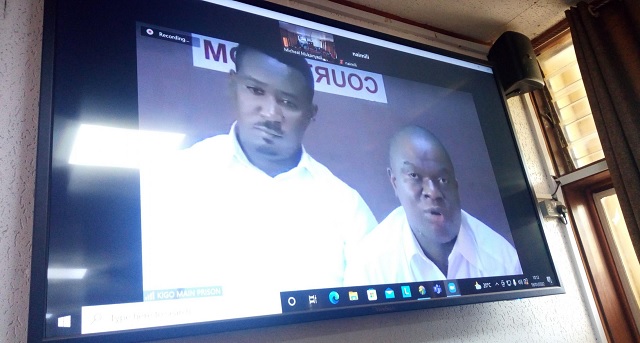Members of Parliament Allan Ssewanyana and Muhammad Ssegirinya are protesting a ban on visitors to Kigo prison where they have been incarcerated for the last five months.
The MPs raised the concerns while appearing before the Masaka Grade One Magistrate Christine Nantege via video conference this afternoon, to receive updates on the progress of investigations into charges of murder and terrorism that were levied against them.
The MPs argue that the directive which was issued by the Commissioner-General of Prisons is leading to serious violations of their inherent human rights. They said that the ban on visitors which was issued under the guise of preventing the spread of COVID-19 to the prisons has instead become a tool of torture and violation of rights for a few targeted inmates.
Ssewanyana told the court that a ban on visitors is not uniformly observed to all inmates, hence not being in a position to eliminate risks of COVID-19 spread in the prison. He reported that on a daily basis, over 200 inmates leave Kigo prison to work in the community and return in the evening, but to their disappointment, the prison authorities are still using the same directive to deny them access to visitors including lawyers, private doctors, and close relatives.
Ssewanyana told the court that besides enduring degrading treatment that includes being forced to sit in the mud every morning, they are also completely detached from their families, something that is psychologically distressing them.
Similarly, MP Muhammad Ssegirinya told the court that the ban has also attracted rage from fellow inmates who are now perceiving them as the cause of their suffering. He added that as a result, his children have not returned to school because he has nobody to give instructions for paying their fees and preparing them to return to school.
These accordingly appealed to the court to compel the prison authorities to lift the restrictions.
Meanwhile, Shamim Malende, the lawyer to the duo also told the court that she has equally been denied access to the prisons facility, which is frustrating efforts to prepare defence documents that require her to first interview the suspects about the charges preferred against them.
She expressed concern that if not reconsidered, besides causing emotional distress to the accused persons, the restrictions will also frustrate their pursuit for justice.
Masaka Resident Chief State Attorney Richard Birivumbuka said that he has taken note of the concerns and pledged to engage prison authorities before he can authoritatively brief the court during the next sitting. But in her ruling, the magistrate instructed the prisons authorities to relax the restrictions and allow the suspects access to visitors, under the observance of the known COVID-19 standard operating procedures. URN









